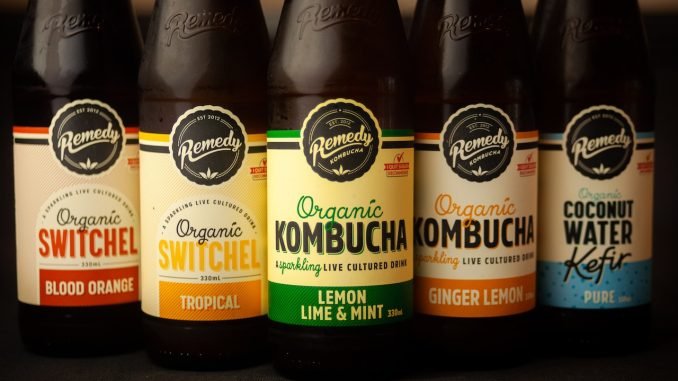
In recent years, a new trend has been making a splash in the beverage world, and that’s alcoholic kombucha. Alcoholic kombucha is a slightly tangy, delightfully fizzy beverage that’s capturing the hearts of health-conscious drinkers and cocktail lovers alike. Combining the gut-friendly benefits of kombucha with the pleasing kick of alcohol, this fizzy drink is making waves for its unique characteristics and alluring flavors.
So, what is it exactly?
Alcoholic kombucha is basically regular kombucha that undergoes a second fermentation process, during which alcohol is introduced. While regular kombucha naturally contains a small amount of alcohol due to the fermentation process, the additional fermentation in alcoholic kombucha elevates the alcohol content to a level that can give you a mild buzz.
What is the Alcohol Content in Alcoholic Kombucha?
Alcoholic kombucha can range anywhere from 0.5% to 6% alcohol by volume (ABV), depending on the duration of the second fermentation and the type of alcohol used. This is considerably more than regular kombucha, which typically contains less than 0.5% ABV.
It’s important to note that the alcohol content can fluctuate based on factors such as the type of yeast used, the sugar content of the kombucha, and the temperature at which it ferments. Thus, crafting the perfect alcoholic kombucha may require some experimentation.
Cracking the Alcoholic Kombucha Code
Before we dive further into the details, let’s discuss the alcoholic kombucha code. In essence, the “code” is nothing more than understanding the process behind this second fermentation with the addition of alcohol.
Cracking the code essentially means grasping the nuances of brewing alcoholic kombucha to achieve the perfect balance between the fizzy kombucha flavor and the alcoholic content. As we move along, we will unfold the various elements of this code and help you brew a perfect batch of alcoholic kombucha.
Is Alcoholic Kombucha Safe?
Like any other alcoholic beverage, alcoholic kombucha should be consumed responsibly. Some people might need to be cautious, such as pregnant women, people with liver or kidney issues, the elderly, and those with compromised immune systems. Additionally, those who are sensitive to alcohol or trying to avoid it should note that even non-alcoholic kombucha contains a trace amount of alcohol.
Health Benefits of Alcoholic Kombucha
- Rich in Probiotics:
Alcoholic kombucha is a powerhouse of probiotics, the beneficial bacteria that support gut health. These probiotics help maintain a healthy balance of gut flora, promoting digestion and nutrient absorption.
- Antioxidant-Rich:
Alcoholic kombucha, particularly when brewed with green tea, is rich in antioxidants. These compounds neutralize potentially harmful free radicals, protecting your cells from damage.
- Enhances Heart Health:
Some studies suggest that kombucha can help manage cholesterol levels, reducing the risk of heart disease. However, further research is needed to validate these findings.
- Supports Liver Health:
Kombucha contains compounds called glucaric acids, which have been shown to support liver health and detoxification processes.
- Boosts Immune System:
The probiotics in kombucha support the health of your gut, where 70% of your immune system resides. A healthy gut often equates to a strong immune system.
How to Make Alcoholic Kombucha – A Step-by-Step Guide to Crafting Your Own
Brewing alcoholic kombucha may sound complicated, but it’s actually a straightforward process. You can start brewing your own fizzy, healthy alcoholic kombucha with these steps:
Step 1: Gather Your Supplies: To start, you’ll need kombucha starter culture (also known as SCOBY), sweet tea, a brewing vessel (a large glass jar works well), and bottles for storage. You will also need alcohol – typically vodka, gin, or tequila.
Step 2: Brew Your Sweet Tea: This forms the base of your kombucha. You can use black, green, or white tea. Simply boil water, steep the tea bags, and stir in sugar or honey until dissolved. Let it cool before moving to the next step.
Step 3: Add Your Starter Culture: Once the tea is cooled, transfer it into your brewing vessel, add in your SCOBY, and stir. This begins the first fermentation process.
Step 4: Add Alcohol: After the first fermentation process (which can take about a week), you can introduce the alcohol. The choice of alcohol is largely dependent on your taste preference. A neutral spirit like vodka won’t influence the flavor as much as tequila or gin would. You can experiment with different types and quantities to see what you like best.
Step 5: Second Fermentation: This is where the magic happens! The second fermentation process is where the alcohol and kombucha mix and ferment, increasing the ABV of your drink. This usually takes a few days. Remember, the longer you leave it, the stronger the alcohol content and the fizzier the brew.
Step 6: Taste Test: Once your second fermentation is complete, it’s time to taste. If you’re happy with the taste and alcohol content, you can move on to the final step. If not, you can allow it to ferment a little longer.
Step 7: Bottling: Now, you’re ready to bottle your homemade alcoholic kombucha. Use a funnel to pour the brew into bottles, leaving some room at the top. Seal the bottles and refrigerate them.
Step 8: Enjoy: After a day or two in the fridge, your alcoholic kombucha is ready to be enjoyed!
Bottling and Storing Alcoholic Kombucha
Bottling and storing alcoholic kombucha is a delicate process. Here are some essential tips for getting it right:
- Use High-Quality, Sealable Bottles: This helps maintain the fizz and freshness of your kombucha.
- Avoid Metal: Use plastic or stainless steel funnels and ladles when transferring your kombucha. Metal can react with the acidic kombucha and spoil the flavor.
- Leave Room at the Top: When bottling, leave about an inch of space at the top. This allows for carbonation and prevents pressure build-up.
- Refrigerate: Storing your bottled kombucha in the refrigerator will slow down fermentation and keep your drink fresh.
- Store Away from Light: Exposure to light can deteriorate the quality of kombucha. Always store it in a dark place.
- Consume within a Month: For the best taste and freshness, consume your homemade alcoholic kombucha within a month of bottling.
Conclusion
Alcoholic kombucha is more than just a trend. With its health benefits, unique taste, and the simple joy of brewing it at home, it’s becoming a staple in many households. We hope this guide gives you the insight you need to dive into the world of alcoholic kombucha.




